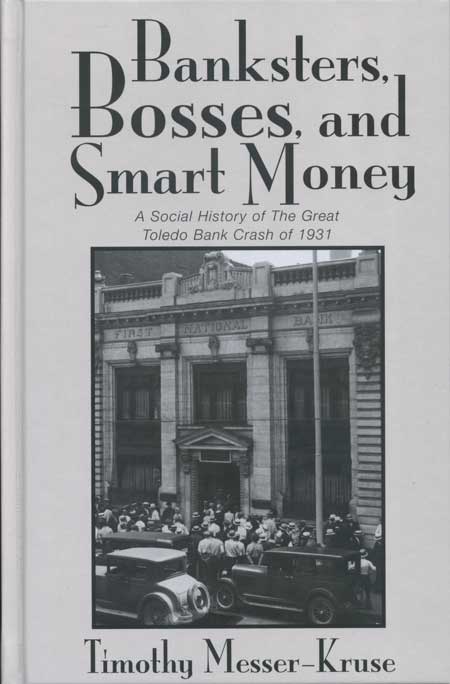 Banksters, Bosses, and Smart Money
Banksters, Bosses, and Smart Money
A Social History of the Great Toledo Bank Crash of 1931
Timothy Messer-Kruse
“This book deals with a largely unexplored domain—local banking panics during the Great Depression—through the lens of one Ohio city. In a highly original contribution to the literature on banking panics during the time, which have heretofore concentrated solely on Chicago and New York, Messer-Kruse provides an exhaustive narrative of the events in Toledo in summer 1931 to the final liquidation of the closed banks in 1940.” —Elmus Wicker, Indiana University
“Banksters, Bosses, and Smart Money will take a place beside a select set of other works in the field, which describe regional idiosyncrasies before and during the Great Depression. Messer-Kruse adds to a growing body of microeconomic and historical literature suggesting that many bank failures of the period were justified, running counter to widely held notions of contagions of fear that felled numerous sound banks, resulting in significant losses of worthwhile lending information and economic capital.” —Joseph R. Mason, Drexel University
In the 1920s, Toledo, Ohio, led the nation in manufacturing job growth. In summer 1931, Toledo suffered the worst banking crash of the Great Depression. Soon afterward, a greater percentage of the people in Toledo survived on federal relief than in any other American city. What caused one of America's most dynamic industrial cities to fall so far, so fast?
Banksters, Bosses, and Smart Money uncovers the causes of one city’s economic collapse by tracing the interlocking directorships, political machines, and insider deals that made quick fortunes for the well-connected while jeopardizing the savings of tens of thousands of depositors. It documents how the power of the city’s financial elites continued even after the calamitous bank crash of 1931, skewing the liquidation of insolvent banks in their favor and shielding those responsible from criminal prosecution.
By examining the social and political roots of the banking crisis in one community, Messer-Kruse demonstrates that the Great Depression cannot be understood only as an external force that crashed over communities, but also as a consequence of local power relations and financial decisions. Toledo’s example suggests that the Great Depression was made locally and spread globally, not the other way around.
Timothy Messer-Kruse is associate professor of labor
history and chair of the department of history, University of Toledo.
|
Nov
2004
American 20th-century business and economic history; Ohio 240 pp. 6 x 9 15 illus. |
|
| $56.95 cloth 978-0-8142-0977-6 | Add cloth to shopping cart |
| $28.95 paper 978-0-8142-5406-6 | Add paper to shopping cart |
| $14.95 CD 978-0-8142-9054-5 | Add CD to shopping cart |


